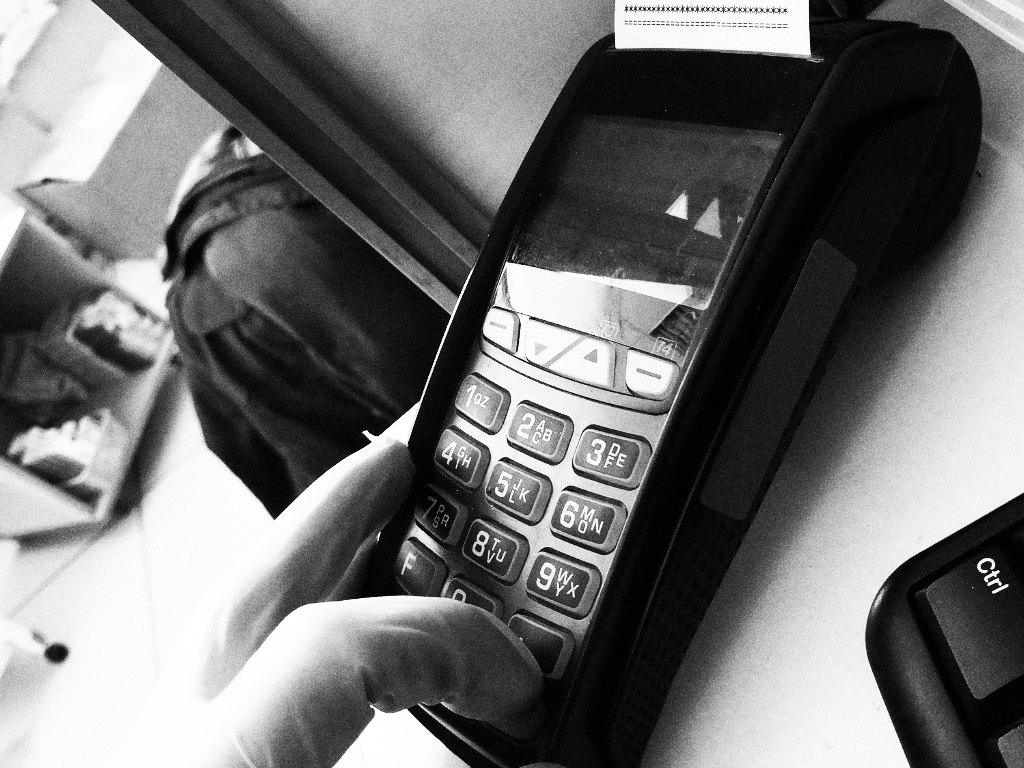
The COVID-19 global pandemic changed the way many US cannabis merchants and operators conduct business, especially concerning providing customers a safe and contactless way to purchase their products. In response, many cashless payment solutions have been implemented in the effort to reduce the use of cash and follow appropriate social distancing protocols.
The two primary types of solutions being implemented by cannabis merchants are (1) cashless PIN debit solutions and (2) direct ACH banking solutions. In this article, I specifically provide an overview of merchant pricing, consumer preferences and the legalities regarding the “cashless” ATM/PIN debit solutions.
The first solution being offered by many cannabis retailers in a “cashless” ATM/PIN debit solution that acts similar to making a cash withdrawal at a traditional ATM. Customers are required to present their debit card and enter their PIN to make a purchase.
The merchant usually requires the purchase to be rounded up to the nearest $5 or $10 increments and the customer receives change in the amount of the difference, usually in physical cash. The customer is usually charged a fee ($2.00–4.00) by the merchant and then receives another on their bank statement for using an “out-of-network” ATM withdrawal ($2.00-$5.00).
Traditionally these “cashless” PIN debit solutions have operated along-side the POS, specifically for issues regarding reconciling the rounding of the transactions. More recently, cannabis POS companies are now offering their own branded solution of these “cashless” ATM/PIN debit solutions. A few primary issues I have identified for the merchants are (1) high costs for the merchant, (2) a poor customer experience, and (3) the liability and risks associated with violating card brand network rules.
The first major issue is the high costs for cannabis merchants, especially to get started. The following pricing model is representative of the industry average offered by many of the cannabis POS solutions:
– $450 per terminal for each driver or POS checkout
– $10/month service fee
– 3.5% + $0.25/transaction charged to merchants on each transaction
– $3.00 – 7.00 flat-fee charged to customers on each transaction
– Employees/Drivers have to round up to the nearest dollar or $5.00 or $10.00 increment.
The second major issue is the poor customer experience. A huge increase in the use of “cashless” ATM/PIN debit solutions is based on the incorrect assumption that these devices are “safer”. The most important reason for cannabis merchants to offer a “cashless” solution is to keep their customers safe by reducing the amount of COVID-19 contagion, either through the use of cash or direct personal contact.
The primary reason for the machines initially was to reduce cash onsite, long before COVID-19 came along. These “cashless” ATM/PIN debit solutions are NOT contactless whatsoever. First of all, the employee/driver is required to transport a large terminal device ($450 each) from delivery to delivery and still requires customer contact with each delivery. Not to mention, the customer now has to pay a merchant and bank fee ($3.00-$7.00) to purchase their products.
The third major issue is violating the payment card network’s internal rules. Here’s what many merchants don’t fully understand about these “cashless” ATM/PIN debit solutions. First, despite what the POSs or payment providers (acquirers) tell you about the “legality” of these solutions, they all specifically violate the payment card network’s internal rules (MasterCard rule 5.11.7 Illegal or branding-damaging transactions/Visa rule 1.5.1.4 Submission of an illegal transaction detail the standard).
The ATM networks (Pulse, NYCE, STAR) all utilize the payment card networks (Visa/MasterCard/Discover) to route transactions to their networks via the 16 digit card number owned by them. If a 16 digit card number was used to purchase products or services deemed illegal or brand-damaging it would be a violation of payment card network rules. This does include when that card number is routed to an ATM/PIN network as the acquirer is still required to report that activity. In essence, the transaction couldn’t have taken place without the payment card’s account number.
In addition to setting up merchants inappropriately, the acquirer (payment processor) is also hiding the business type with an incorrect Merchant Category Code (MCC). Since cannabis is still federally illegal, there is no MCC to classify it.
The larger issue is until US federal legalization and/or removal of cannabis from the DEA’s Schedule 1 Controlled Substances list there are potential Anti-Money Laundering (AML) activities occurring with the funds derived from a federally classified Schedule 1 controlled substance. Due to the illegal status of cannabis at the federal level, such activity will be deemed as promoting money laundering by the federal regulators.
By facilitating these transactions, the acquirer and their merchants are knowingly circumventing the payment card network’s internal rules and specifically violates AML regulations by knowingly disbursing funds to customers purchasing a “technically” illegal Schedule 1 controlled substance.
These funds are then distributed back into the US financial banking system without the required FinCEN (Financial Crimes Enforcement Network) filings. Therefore, based on FIN-2014-G001 BSA Expectations Regarding Marijuana-Related Businesses, for institutions that provide payment solution medical marijuana dispensaries, payments must be identified and included in all initial and continuous Marijuana SARS filings.
The good news is that fully legal and compliant digital payment options are available that operate within federal & state regulations and comply with the payment card network’s internal rules. Merchants should always verify a few pieces of information when selecting a digital payment provider: (1) Federal MSB Registration: This information is public and can be found on FinCEN’s website (https://www.fincen.gov), (2) Compliance with payment card network’s internal rules (ie: no 16 digit payment cards), (3) Transparent & verifiable banking relationships, and (4) State required Money Transmission Licencing (MTL) in applicable states.
Unlike other “cannabis” payment processors in this industry, Alt Thirty Six does not enable card payments on the platform. Many processors enable merchants to accept debit and credit card payments by circumventing the card network’s internal rules, these processors are knowingly exposing their clients and sponsor banks to serious risk.
Through our proprietary technology and established banking relationships, Alt Thirty Six enables cannabis merchants to seamlessly accept electronic payments in-store and online via the ACH network. Aiming to position ourselves for the long run, Alt Thirty Six has taken a different approach. Rather than circumvent the rules, we believe the key to success in this industry can be achieved only through absolute compliance and transparency. Therefore, while others look for a quick way to market, Alt Thirty Six invested the necessary time and capital to build a fully compliant and robust digital payments platform designed specifically for the cannabis industry.







